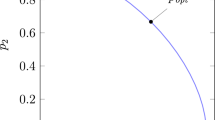Abstract
No-cloning theorem says that there is no unitary operation that makes perfect clones of non-orthogonal quantum states. The objective of the present paper is to examine whether an imperfect cloning operation exists or not in a C*-algebraic framework. We define a universal \(\epsilon \)-imperfect cloning operation which tolerates a finite loss \(\epsilon \) of fidelity in the cloned state, and show that an individual system’s algebra of observables is abelian if and only if there is a universal \(\epsilon \)-imperfect cloning operation in the case where the loss of fidelity is less than \(1/4\). Therefore in this case no universal \(\epsilon \)-imperfect cloning operation is possible in algebraic quantum theory.
Similar content being viewed by others
References
Alberti, P.M.: A note on the transition probability over C*-algebras. Lett. Math. Phys. 7, 25–32 (1983)
Alberti, P.M., Uhlmann, A.: Stochastic linear maps and transition probability. Lett. Math. Phys. 7, 107–112 (1983)
Araki, H., Raggio, G.A.: A remark on transition probability. Lett. Math. Phys. 6, 237–240 (1982)
Bures, D.: An extension of Kakutani’s theorem on infinite product measures to the tensor product of semifinite W*-algebras. Trans. Am. Math. Soc. 135, 199–212 (1969)
Bužek, V., Hillery, M.: Quantum copying: Beyond the no-cloning theorem. Phys. Rev. A. 54, 1844–1852 (1996)
Clifton, R., Bub, J., Halvorson, H.: Characterizing quantum theory in terms of information-theoretic constraints. Found. Phys. 33, 1561–1591 (2003)
Dieks, D.: Communication by EPR devices. Phys. Lett. 92, 271–272 (1982)
Haag, R., Kastler, D.: An algebraic approach to quantum field theory. J. Math. Phys. 5, 848 (1964)
Horuzhy, S.S.: Introduction to Algebraic Quantum Field Theory. Springer, Berlin (1990)
Kadison, R. V. and Ringrose, J. R.: Fundamentals of the Theory of Operator Algebras, Vol. I: Elementary theory. American Mathematical Society (1983)
Kadison, R.V., Ringrose, J.R.: Fundamentals of the theory of operator algebras, Vol. Advanced theory. American Mathematical Society, II (1983)
Nielsen, M.A., Chuang, I.L.: Quantum Computation and Quantum Information. Cambridge University Press, Cambridge (2000)
Paulsen, V.: Completely Bounded Maps and Operator Algebras. Cambridge University Press, Cambridge (2002)
Promislow, D.: The Kakutani theorem for tensor products of W*-algebras. Pac. J. Math. 36, 507–514 (1971)
Raggio, G.A.: Comparison of Uhlmann’s transition probability with the one induced by the natural positive cone of von Neumann algebras in standard form. Lett. Math. Phys. 6, 233–236 (1982)
Roberts, J.E., Roepstorff, G.: Some basic concepts of algebraic quantum theory. Commun. Math. Phys. 11, 321–338 (1969)
Roos, H.: Independence of local algebras in quantum field theory. Commun. Math. Phys. 16, 238–246 (1970)
Takesaki, M.: Theory of Operator Algebras I. Springer, Berlin (2002)
Uhlmann, A.: The “transition probability” in the state space of a *-algebra. Rep. Math. Phys. 9, 273–279 (1976)
Uhlmann, A.: The transition probability for states of *-algebras. Ann. Phys. 497, 524–532 (1985)
Wootters, W.K., Zurek, W.H.: A single quantum cannot be cloned. Nature 299, 802–803 (1982)
Acknowledgments
The author wishes to thank Izumi Ojima and Yutaka Shikano for helpful comments on an earlier draft. The author is supported by the JSPS KAKENHI, No.23701009 and the John Templeton Foundation Grant ID 35771.
Author information
Authors and Affiliations
Corresponding author
Rights and permissions
About this article
Cite this article
Kitajima, Y. Imperfect Cloning Operations in Algebraic Quantum Theory. Found Phys 45, 62–74 (2015). https://doi.org/10.1007/s10701-014-9843-8
Received:
Accepted:
Published:
Issue Date:
DOI: https://doi.org/10.1007/s10701-014-9843-8



